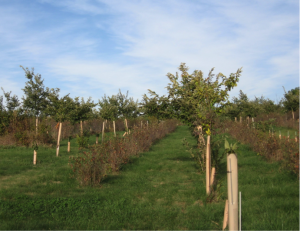As Midwestern farmers continue to look to conservation and crop diversification to protect their land and keep their farms profitable, some are seeking innovative cropping systems like agroforestry to meet these goals. One such farmer is Kevin Wolz and his team at Midwest Agroforestry Solutions. ‘Agroforestry’ is a term for an array of agricultural practices that combine trees with crops or livestock. Kevin’s farm business is trying to revolutionize agriculture in the Midwest by creating a cropping system that incorporates perennials like chestnuts, hazelnuts, currents, and berries, and pairs it with annual crops, grazing livestock, or hay production between the rows of these perennials. The crops are arranged in a way that maximizes biodiversity and management efficiency, and assures high productivity across the farm.
Kevin established his business in 2014. At the time, he was an engineering and biology student at the University of Illinois. Kevin believes that agroforestry systems are critical to sustainable agriculture in the Midwest, and he has been working with researchers and practitioners to develop the best systems for the central Illinois region. On his research farms, his team has planted over 125,000 trees, shrubs, and other perennial plants on over 200 acres and 20 sites around the Midwest. In 2015, they signed a 99-year lease with Cathe Capel, a small livestock farmer, in Sidney, Illinois. That 10 acres became Vulcan Farm, which now serves as a research site and nursery for the other sites maintained by the team.
 Kevin wants to help more farmers in central Illinois establish agroforestry practices on their land. He has expanded his team to help connect new farmers and landowners who are hoping to install perennials on their property. They have found that there are a lot of farmers and landowners out there who feel compelled to put down perennial roots on their land, whether it’s for conservation or beautification or just growing something new and interesting that will last years or decades.
Kevin wants to help more farmers in central Illinois establish agroforestry practices on their land. He has expanded his team to help connect new farmers and landowners who are hoping to install perennials on their property. They have found that there are a lot of farmers and landowners out there who feel compelled to put down perennial roots on their land, whether it’s for conservation or beautification or just growing something new and interesting that will last years or decades.
In 2019, the farms’ first perennial crops will begin to reach maturity, and the team is preparing to begin marketing their yields. They already sell black currant puree and frozen whole black currants to breweries, wineries, dairies, and other wholesale buyers across the country. This year, they expect see the availability of many other crops, including red currants, herbs, asparagus, decorative willow, and even hazelnuts. The team will employ mechanized harvesting equipment for their fruit and nut crops, which will then be aggregated with the harvest from partner farms across the Midwest and processed regionally. They will then sell these to a growing list of customers eager to work with unique crops produced in the Midwest in regenerative agricultural systems.
Kevin and his team are seeking new partners eager to consider a long-term lease for agroforestry on their land; investors who are looking towards opportunities in agroforestry, tree crops, and regenerative agriculture; and tree crop and livestock farmers interested in integrating perennial plantings and crops into their farm landscape. Kevin says: “Agriculture in the Midwest needs a transformation. Perennial crops and tree crops will be critical to making agriculture more ecologically and economically resilient. We can’t do this alone – please join us!”
If you would like to learn more about agroforestry and diversifying agriculture, we are hosting a summit on March 14 in Bloomington where Kevin will be delivering a keynote address. Come by and discuss revolutionizing agriculture in central Illinois!
This post was co-authored by Jeff Hake and Mallory Krieger. More information about Midwest Agroforestry Solutions can be found online at www.MidwestAgroforestry.com.


